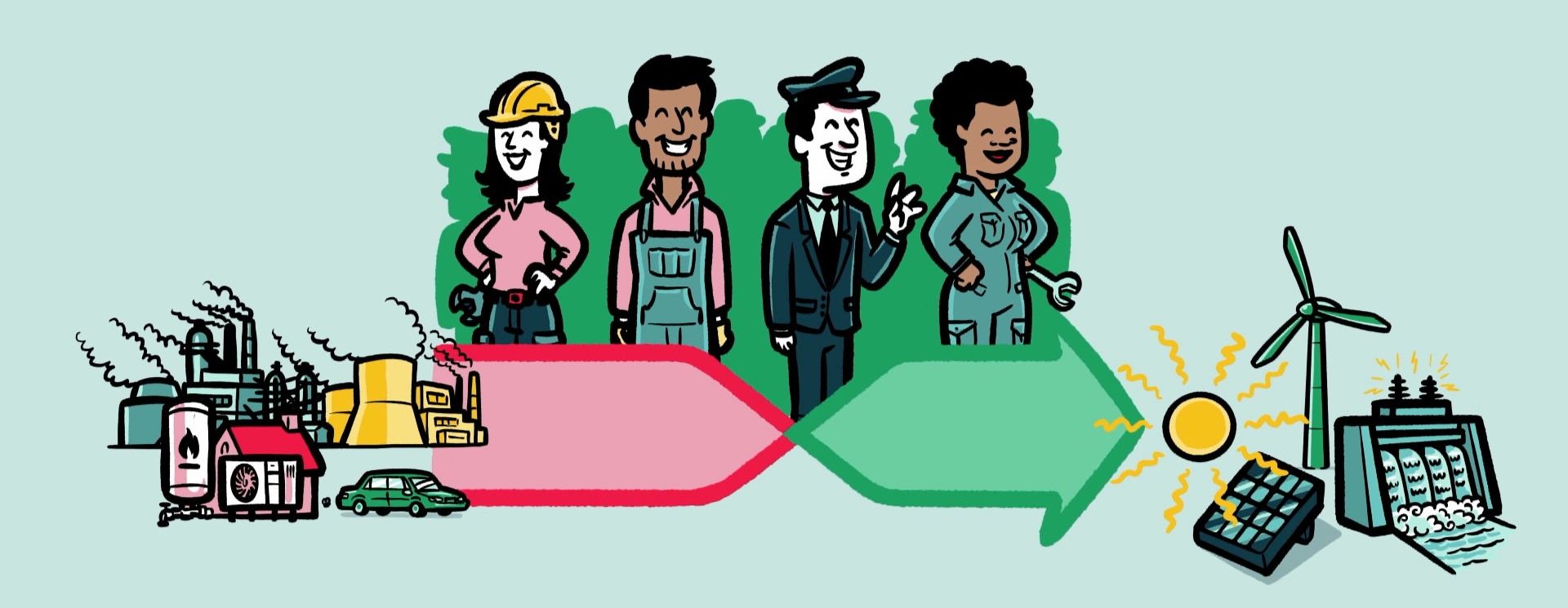Climate Jobs

Green House has been developing a model for the jobs created by the transition required to address both the Climate and Biodiversity crises as well as shift towards sustainable resource consumption. This work began in 2016 and has since lead to work focusing for various regions. Below are a collection of reports, models and works written by Green House and our partners.
Between 2017 and 2019 Green House developed a model for estimating the jobs created by the transition required to address both the Climate and Biodiversity crises as well as shift towards sustainable resource consumption. This work included, the publication of Unlocking the Job Potential of Zero Carbon, by the Green European Foundation with the support of Green House think tank. This contains the results of modelling for the UK, Hungary and Ireland, carried out with the support of Green Foundation Ireland and Ecopolis in Hungary. The report was launched at Towards a New Climate, Katowice, 11th December 2018 , a fringe event to COP24.
In 2019 Green House produced summary reports for all local areas in the UK. This has subsequently lead to Green New Deal / Climate Jobs reports for Cumbria, economy areas around Gatwick and Leeds-Braford Airports.

Project Publications & Events
Beyond Drax: A Real Green Future for Yorkshire and the Humber
In this report we quantify and describe over 70,000 green jobs across various sectors in Yorkshire and the Humber over ten years. We propose a redirection of Drax subsidies towards this vision.
Presentation: Why do green jobs plan need a different politics and economics?
Jonathan Essex speaks at the Greener Jobs Alliance AGM about why green jobs plans need different politics and economics.
A Green New Deal for Leeds City Region
The event will launch the report, A Green New Deal for Leeds City Region: GALBA's Vision for a Sustainable Local Economy which was written in collaboration with Green House and published by the Green European foundation
Green Jobs and Airport expansion
This online event heard from authors of the report, A Green New Deal for Gatwick along with trade unionists and local airport campaigners on how to challenge the local jobs case for airport expansion and make the case for a different route.
Cumbria and green jobs in Left Foot Forward.
Green House's Anne Chapman discusses the potential for a transition in the Cumbria region into an economic powerhouse and the impact on jobs and the environment
The Potential for Green Jobs in Cumbria
report looks at the implications of a transition to net zero carbon by 2037 - a target date adopted by the Zero Carbon Cumbria Partnership. There could, on average, be 9,000 additional jobs, mostly in renewable electricity generation but also in transport, industry and waste management.
A Green New Deal for Gatwick
Many job opportunities near Gatwick are at the airport or in associated sectors. Covid-19 brought an almost complete cessation of flying, with a slow regrowth likely to take years to return to prior levels. Contemplation of a different future for workers across the Gatwick region has become urgent
Climate Jobs and a Just Transition: responding to our climate emergency
The final event of our Climate Jobs project for this year at which Jonathan Essex and Peter Sims will be presenting the results of our climate jobs modelling for Northern Ireland. This one day conference is organised by the Green European Foundation with the support of Green Foundation Ireland.
Climate Emergency Conference- Raising Ambition
A one-day conference for those looking to act on the climate emergency. Why we need to keep fossil fuels in the ground and how we can shift to a zero carbon economy. What scale of change do we need to be looking at? What would the benefits be for jobs and local economies?
Climate Jobs in Poland
As part of our 2019 project with the Green European Foundation, Green House has worked with partners in Poland - Fundacja Strefa Zieleni and the Institute for Sustainable Development - on estimates of climate jobs in Poland.
Climate Jobs Regional Reports
We have produced summary reports showing the results of our climate jobs modelling for each 'NUTS' area, down to level 3, area in the UK.
Unlocking the Job Potential of Zero Carbon
This report outlines the methodology used and results of our climate jobs modelling work in the UK, Ireland and Hungary carried out in 2018. It is published by the Green European Foundation, with the financial support of the European Parliament to the Green European Foundation.
Climate Jobs in the UK
This event presented the results of modelling to estimate the net number of jobs that could be created in each local authority area by the transition to a zero carbon economy, in the key sectors of energy, transport, waste management, buildings and food, farming and forestry.
Just Transition, Climate Jobs
Green European Foundation, with the support of Green Foundation Ireland and in partnership with SIPTU and the Dublin Council of Trade Unions, present an all-day Seminar on the theme: Jobs in a Changing Climate
Job creation from a Sustainable Transition for Sheffield City Region
This report uses Sheffield City Region as a case study and looked at renewable energy, transport, buildings, farming, forestry and food, and reuse, repair and recycling. Where they could be quantified, the numbers of jobs that would be lost were subtracted from the number of jobs created.















